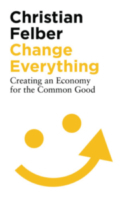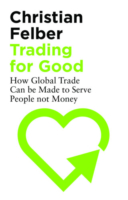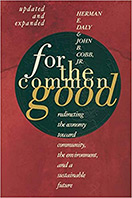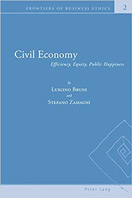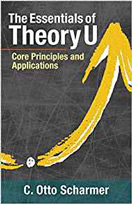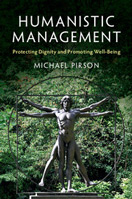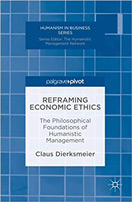
“The economic anarchy of capitalist society as it exists today is, in my opinion, the real source of the evil.”
— Albert Einstein, 1949
10 Cornerstones of the ECG
1. The Economy for the Common Good is a bridge to an ethical market economy, whose goal is not the increase of monetary capital, but a good life for all.
2. Human dignity, solidarity and social justice, environmental sustainability and democracy are guiding values.
3. The Common Good Matrix shows how these values can be lived in everyday business life. It is continually being developed and should be decided upon democratically.
4. Companies use the Matrix to draw up a Common Good Balance Sheet. In the Common Good Report, they explain the implementation of the common good values as well as their development potential and make an assessment. The report and balance sheet are reviewed by auditors and made available to the public.
5. ECG companies are recognized and supported by consumers, cooperation partners and common good-oriented sponsors.
6. As compensation for their above-average performance, ECG companies are to receive legal advantages in taxes, loans and public contracts as well as in international trade.
7. Business profits serve to strengthen the companies, generate income and provide for long-term financial security of the owners and employees, not, however, to increase the assets of external investors. Thus, the owners are given the freedom to develop common good-oriented business practices, free from pressure to achieve the highest possible return on investment.
8. The drive for economic growth decreases. Opportunities for a fulfilled life are opened up while preserving our natural resources. In work, appreciation and fairness as well as creativity and cooperation can develop better.
9. Limiting wealth inequalities increases the chances for equal participation of all in economic and political life.
10. The Economy for the Common Good movement invites people to help shape a new economy based on dignity, social justice and environmental sustainability. All ideas for a sustainable economic order should be developed in democratic processes, decided by people as sovereign and anchored in national constitutions.
Frequently Asked Questions on ECG Theory
Companies aspire for profit maximisation so they squeeze each other out of the market until there are only a few large corporations left. These corporations then have power over consumers and states, and can dictate global events. Environmental and social standards get crushed in the quest for profit.
More growth is not possible on a finite planet. Capitalism and communism have failed. We now need new ideas, for example the Economy for the Common Good.
The Economy for the Common Good is focussed on the real purpose of business – meeting our human needs. This primarily involves forging successful relationships: they are a requirement for being happy, and they are a requirement for the common good.
Money, in contrast, is only a means of economic activity: economic output, measured in money, does not indicate whether the common good is rising or falling. To measure whether this purpose is being fulfilled, other indicators are required.
Organisations can assess their contribution to the common good by evaluating how successful their relationship is with suppliers, investors, employees, customers and the social environment based on indicators such as human dignity, solidarity, environmental sustainability, social justice and democratic participation. Alongside a financial balance sheet, they would provide a Common Good Balance Sheet in which their contribution to the common good is assessed in points.
By consulting the Common Good Balance Sheet, customers can see how much an individual company is contributing to the common good – and they can bear this in mind when shopping.
In addition, organisations that do much for the common good can obtain further market advantages through lower taxes, easier access to subsidies or loans or through preferential arrangements in public purchasing. This makes their products not only more attractive, but also more cost-effective.
Suddenly, sustainable, fair, democratic and cooperative organisations will have the advantage. Regional economic cycles will gain momentum. Decent workplaces and high-quality products and services will be created, while environmental damage and social problems will be reduced.
Within the framework of fair trade agreements, countries recognise each others’ Common Good Balance Sheets. Products and services that damage the common good will have customs duties imposed on them or they will be prevented from importing at all.
More than 500 organizations across Europe and the Americas have already compiled Common Good Balance Sheets – and the number keeps growing. Regional groups are being established everywhere, raising awareness locally, and influencing policy. The first Common Good communities and regions are emerging, and by networking with other initiatives, an increasingly strong international movement is evolving.
Democratic Assemblies – Sovereign Democracy
“Post-democracy” is a field of political science which discusses the crisis state of democracy. Brexit and the elections of populists around the globe are symptoms that democracy does not function as many would like it to. There are, however, signals of hope. In Munich, Germany the people forced the closure of the coal power plant, in Ireland the Citizen Assemblies have proven very effective, and in Iceland, a People’s Constitution has been drawn up by a citizens’ convention.
Economy for the Common Good has developed the concept of “sovereign democracy”. It states that citizens are the sovereign and therefore hold the final say in decisions of national import. The concept of sovereign democracy can be developed step by step over the next years and can then be put into practice. The initial idea consists of a series of reforms and new rights for the sovereign. One of these is the instrument of the “Democratic Assembly”, in which the fundamental questions in a particular city, region or country are discussed and voted on by the population.
Implementation approaches for Democratic Assemblies:
A first example of an economic assembly is included as an appendix in the current edition of “Change Everything” by Christian Felber. This can help people get an idea of what type of questions could be asked. A first exercise could consist in composing democratically the „Common Good Product“. It is a core idea of the ECG model and consists of the 20 most important elements of life quality, a good life for all or – the common good. Different from the UN SDGs, the OECD Better Life Index or Buthan‘s Gross National Happiness, the Common Good Product would be composed directly by the citizens. After sorting out the 20 mostly supported subgoals of an unlimited number of proposals, an implementation committee would have to find 1 to 3 indicators with which the achievement of the subgoals are measured. The Common Good Product can be measured as a whole – e. g. in Common Good Points – or by each and every of its 20 subgoals. The ECG movement is currently preparing such a convention for its own internal organization. The first municipalities and districts have shown interest. The first real conventions are starting in Münster and Minden, Germany.
As part of her Master’s thesis, Martina Schmitt from the University of Kassel, Germany made a survey based on the Book Money – The New Rules of the Game from C. Felber of 121 visitors at an exhibition in Switzerland about money. The 30 questions covered topics such as how our money system should be designed, target setting for banks, guidelines for lending and for the creation of money. In 92.6 % of the cases, the participants agreed to proposals that deviated from current government policy. Favored proposals included limiting the size of banks, allowing bank loans only for real transactions, an ethical credit check and limiting the creation of money to central banks. The proposal “The Common Good should be the primary goal of a bank” was supported by 68%.
In his book “Ethics-based Trade”, Christian Felber has prepared 20 possible questions on 12 key topics for an international trade order. In a first trial round on the Internet, 150 volunteers voted on the proposals. Although this sample is not representative, the result is encouraging. Where will the first formally legitimate and representative convention take place?
Literature
by Christian Felber, Zedbooks, 2019

